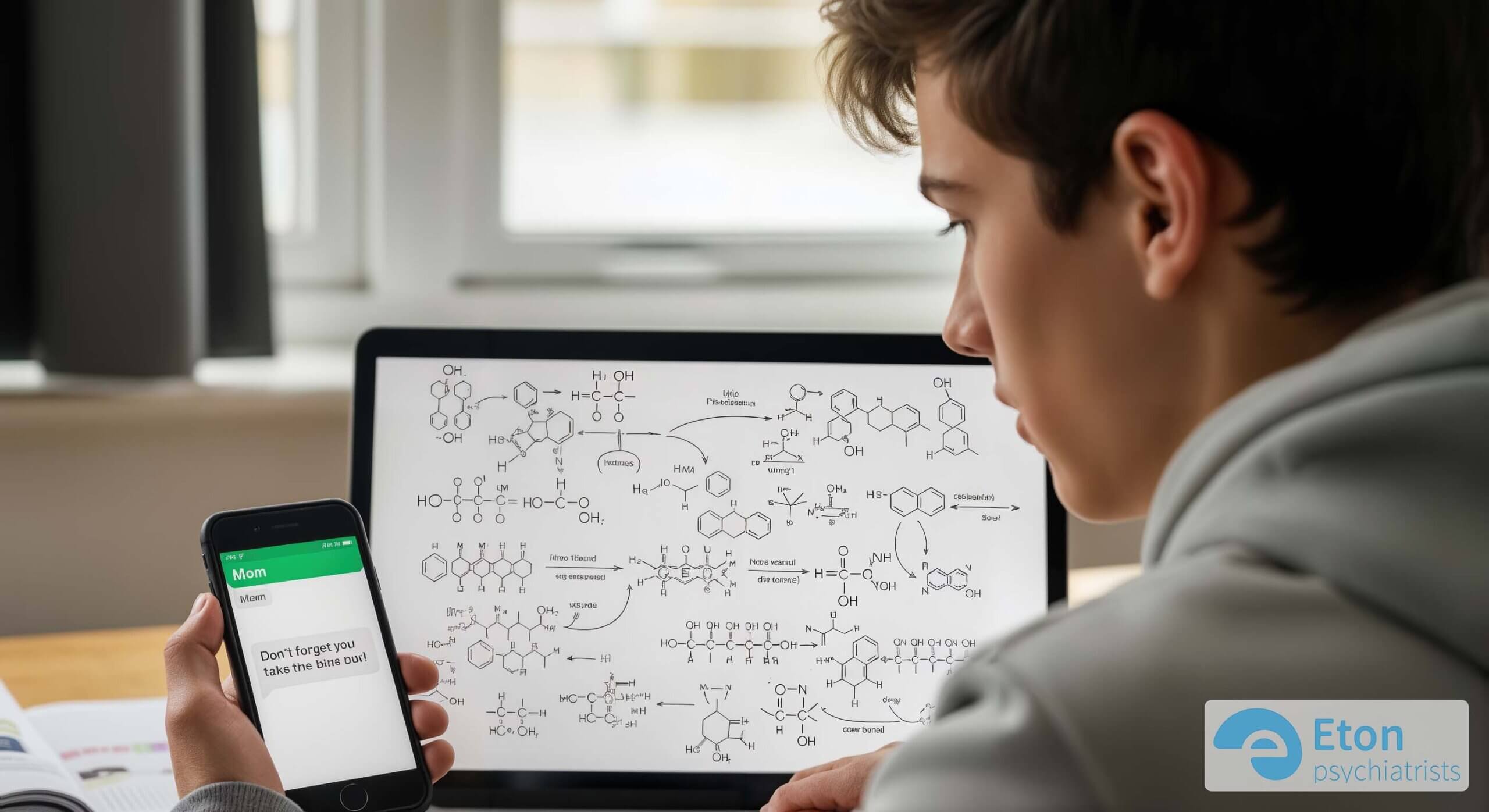
ADHD in High-IQ Teens: Signs You Might Be Missing
Listen to the Article
For those on the go or who prefer listening, you can play the full audio version of this deep dive below.

Does your teenager ace complex physics exams but consistently forgets their PE kit? Can they debate global politics with startling insight, yet struggle to start a simple essay? This confusing mix of high capability and baffling inconsistency is a hallmark of gifted teens with underlying Attention-Deficit/Hyperactivity Disorder (ADHD).
It’s a frustrating paradox. Their intelligence is so effective at compensating for and hiding the core challenges of ADHD that the condition often goes completely undiagnosed. This can leave both teens and parents feeling bewildered and alone. This guide provides the clinical clarity you deserve. We will untangle this paradox, explain the subtle signs to look for, and outline the path to a definitive, specialist diagnosis.
Table of Contents
- “Am I Smart, or Am I Struggling?” Understanding the Lived Experience
- Why Giftedness and ADHD Are So Often Confused
- 8 Subtle Signs of ADHD in Gifted Teens
- The Unique Challenges for High-IQ Girls with ADHD
- Your Path to a Clear Diagnosis in the UK
- Why Trust Eton Psychiatrists?
- Take the First Step Towards Clarity
- Summary
- Frequently Asked Questions
“Am I Smart, or Am I Struggling?” Understanding the Lived Experience
If you are a high-achieving teen who suspects you have ADHD, or the parent of one, you have likely felt a profound sense of confusion. You might have spent years wondering why certain “simple” tasks feel incredibly hard, even when you can handle complex problems with ease. This feeling of being a walking contradiction is a common and valid starting point for seeking answers.
Many describe the deep, internal conflict of being told you are “so smart” while feeling like you are struggling just to keep up. This leads to a pervasive feeling of being a fraud, what clinicians call “imposter syndrome.” It’s the painful belief that your successes are just luck, and it’s only a matter of time until you are “found out.”
For many, a diagnosis isn’t a label; it’s a moment of validation, a key that finally explains a lifetime of unseen struggles. At Eton Psychiatrists, we see you, and we understand the complexity of this paradox. Our goal is to move past the confusion and provide a space where your experiences are understood through a lens of specialist clinical expertise.
Why Giftedness and ADHD Are So Often Confused
The single biggest challenge in identifying ADHD in high-IQ teens is that many behaviours associated with giftedness look remarkably like ADHD. A teacher, or even a clinician without specialist training, may easily misattribute genuine attentional difficulties to a teen’s intellectual curiosity or boredom, leaving the underlying condition unaddressed.
How High Intelligence Can Camouflage ADHD
One of the biggest barriers to diagnosis for high-IQ teens is “masking”. This is an unconscious or conscious strategy where a teen uses their intelligence to hide their ADHD-related difficulties. They become expert actors, playing the part of a student who has it all together.
Masking can look like:
- Extreme Perfectionism: Spending far more time on homework than necessary to ensure it’s flawless, hiding any initial disorganisation or struggle.
- Social Mimicry: Carefully observing and copying the social behaviours of peers to fit in, which requires immense mental energy.
- Panic-Based Motivation: Relying on the adrenaline of a last-minute deadline to push through executive function “paralysis” and produce high-quality work.
While masking can be an effective survival tool in the short term, it comes at an enormous cost. The constant self-monitoring is mentally exhausting, leading to chronic stress, anxiety, and a profound sense of burnout.
8 Subtle Signs of ADHD in Gifted Teens
Because of masking and the overlap with gifted traits, the classic signs of ADHD are often missed. Instead, the struggles manifest in more subtle, paradoxical ways. Here are eight signs that you may not find on a standard checklist.

- The Hyperfocus-Paralysis Cycle: You might notice your teen can spend twelve uninterrupted hours coding a video game or mastering a complex piece of music—this is “hyperfocus.” Yet when asked to tackle a 20-minute worksheet on a less interesting topic, they experience “task paralysis,” unable to even begin. It isn’t laziness. It’s a wiring difference in attention regulation.
- A Racing Mind, Not Restless Legs: While some teens with ADHD are physically hyperactive, many high-IQ individuals experience it internally. Their body might be still, but their mind is in constant motion, jumping between ideas, scenarios, and worries. This can make it incredibly difficult to fall asleep or relax.
- Sophisticated Procrastination: This isn’t just putting things off. The gifted teen with ADHD develops elaborate systems of procrastination, justifying delays until the pressure is immense. They know, consciously or not, that only the adrenaline rush of an imminent deadline can break through their executive dysfunction.
- The Working Memory Gap: This is one of the most baffling signs. Your teen can memorise the entire periodic table but cannot remember a three-step instruction. They retain vast amounts of complex, static information but struggle with active “working memory”—the mental sticky notes needed for daily tasks.
- Heightened Emotional Intensity & Rejection Sensitivity (RSD): Gifted teens often feel emotions with great intensity. When combined with ADHD, this can result in what many experts and individuals call “Rejection Sensitive Dysphoria” (RSD)—an extreme emotional pain triggered by perceived rejection, criticism, or failure. While not a formal clinical diagnosis, it is a widely recognised and deeply felt aspect of the ADHD experience. A teacher’s mild critique can feel like a devastating personal attack.
- Social Awkwardness Despite a Strong Vocabulary: They might have the vocabulary of a university professor but struggle to navigate the fluid, fast-paced dynamics of a teenage social group. They might miss non-verbal cues, interrupt at the wrong time, or feel like they are performing from a script, leading to feelings of alienation.
- Intellectually Adult, Emotionally Young: “Asynchronous development” is common in gifted children, meaning their intellectual, emotional, and social skills develop at different rates. In a teen, this is amplified. They can be intellectually 18 but have the emotional regulation skills of a 12-year-old, which is confusing for them and everyone around them.
- A Deep-Seated Feeling of Being an Imposter: This is the result of living the paradox. When you are constantly told you are “so smart” but you know you are struggling internally, you start to feel like a fraud. This undermines their self-esteem no matter how much they achieve.
The Unique Challenges for High-IQ Girls with ADHD
The masking effect is often amplified in girls. Societal pressure encourages girls to be organised, agreeable, and conscientious, leading them to pour even more energy into hiding their symptoms. Their ADHD is more likely to be the inattentive type, which is quieter and less disruptive than hyperactivity.

Instead of causing trouble in class, they “drift off” into complex daydreams. Their hyperactivity is internalised as anxiety or a racing mind. Because they often maintain good grades through sheer effort and intelligence, their very real struggles are dismissed as character traits like being “ditzy” or “overly sensitive.” This leads to a higher rate of missed diagnoses. (Source: The ADHD Foundation UK)
Your Path to a Clear Diagnosis in the UK: A Step-by-Step Guide
Navigating the path to an ADHD assessment can feel daunting, but you have clear options. Here is a practical guide to the process.
Step 1: Document Your Experiences: Before approaching a professional, take time to document specific examples of the struggles you see. Think about school reports, feedback from teachers, and challenges in daily life (e.g., managing homework, remembering appointments, emotional outbursts). The more specific the examples, the clearer the picture.
Step 2: Understand Your Options (NHS & Private): In the UK, you can pursue a diagnosis through the NHS, though waiting lists can be long. Alternatively, a private assessment with a specialist clinic offers a faster, more direct route to clarity. It allows you to choose a clinician with specific expertise in complex cases, such as Twice-Exceptional individuals.

Step 3: What to Expect in a Specialist Assessment: A gold-standard assessment is a holistic process. It involves a deep dive into developmental history, from early childhood to the present day. It will explore experiences at school, at work, and in personal life, often with input from a parent or partner to build a complete, three-dimensional picture.
Why Trust Eton Psychiatrists?
Choosing a clinic for a life-changing assessment requires immense trust. At Eton Psychiatrists, we specialise in the nuanced and often complex presentation of conditions like ADHD and Autism. We are not a general practice; we are a specialist psychiatry clinic dedicated to understanding and diagnosing complex neurodevelopmental conditions.
Our team of consultant psychiatrists understands that high intelligence doesn’t preclude real struggle; it simply changes its appearance. Our process is rooted in empathy, clinical rigour, and a commitment to providing the validation and clarity that can unlock a new chapter in your life. To learn more about our values and our team, please visit our [LINK: about-us-page-slug].
Take the First Step Towards Clarity
If this guide has felt like reading your own biography, you are not alone. For years, you or your teen may have felt that there is more to the story than just high intelligence. That feeling deserves to be validated with clinical clarity.
Understanding whether ADHD is part of your unique neurotype isn’t about finding a new problem. It’s about finding the right explanation—one that unlocks the right support, strategies, and a deeper, more compassionate understanding of yourself. If you are ready to move from confusion to clarity, our specialist team is here to help.
Summary
- High intelligence doesn’t prevent ADHD; it often hides or “masks” it, leading to missed diagnoses.
- Teens with both giftedness and ADHD are called “Twice-Exceptional” (2e). They live with a frustrating paradox of being highly capable in some areas and struggling in others.
- The signs of ADHD in gifted teens are often subtle and paradoxical, such as having intense “hyperfocus” on passions but “task paralysis” for mundane work.
- Key signs include a racing mind (internal hyperactivity), a significant gap between long-term memory and short-term “working memory,” and heightened emotional sensitivity (RSD).
- Masking the symptoms is mentally exhausting and often leads to imposter syndrome, anxiety, and burnout.
- A specialist assessment is crucial to untangle the traits of giftedness from the symptoms of ADHD and provide a clear diagnosis.
Sources
Frequently Asked Questions
How can you tell the difference between giftedness and ADHD?
The key difference is the reason for the behaviour. A gifted child might be inattentive due to boredom, whereas a teen with ADHD struggles to sustain attention even on interesting tasks due to executive dysfunction. A professional assessment is the only way to be sure.
Can a person be both gifted and have ADHD?
Yes. This is called “Twice-Exceptional” or 2e. The two are not mutually exclusive; a person can have outstanding intellectual gifts alongside the neurodevelopmental challenges of ADHD.
Do gifted children mask their ADHD symptoms?
Yes, very often. They use their high intelligence to develop compensatory strategies that hide their difficulties with focus, organisation, and memory. This masking is a major reason why 2e teens are so frequently undiagnosed.
Why do gifted teens with ADHD often feel like imposters?
Imposter syndrome arises from the internal conflict between their identity as a “smart person” and their daily experience of struggling with tasks that seem simple for others. This mismatch makes them feel like they are faking their intelligence and that they will eventually be exposed as a fraud.



